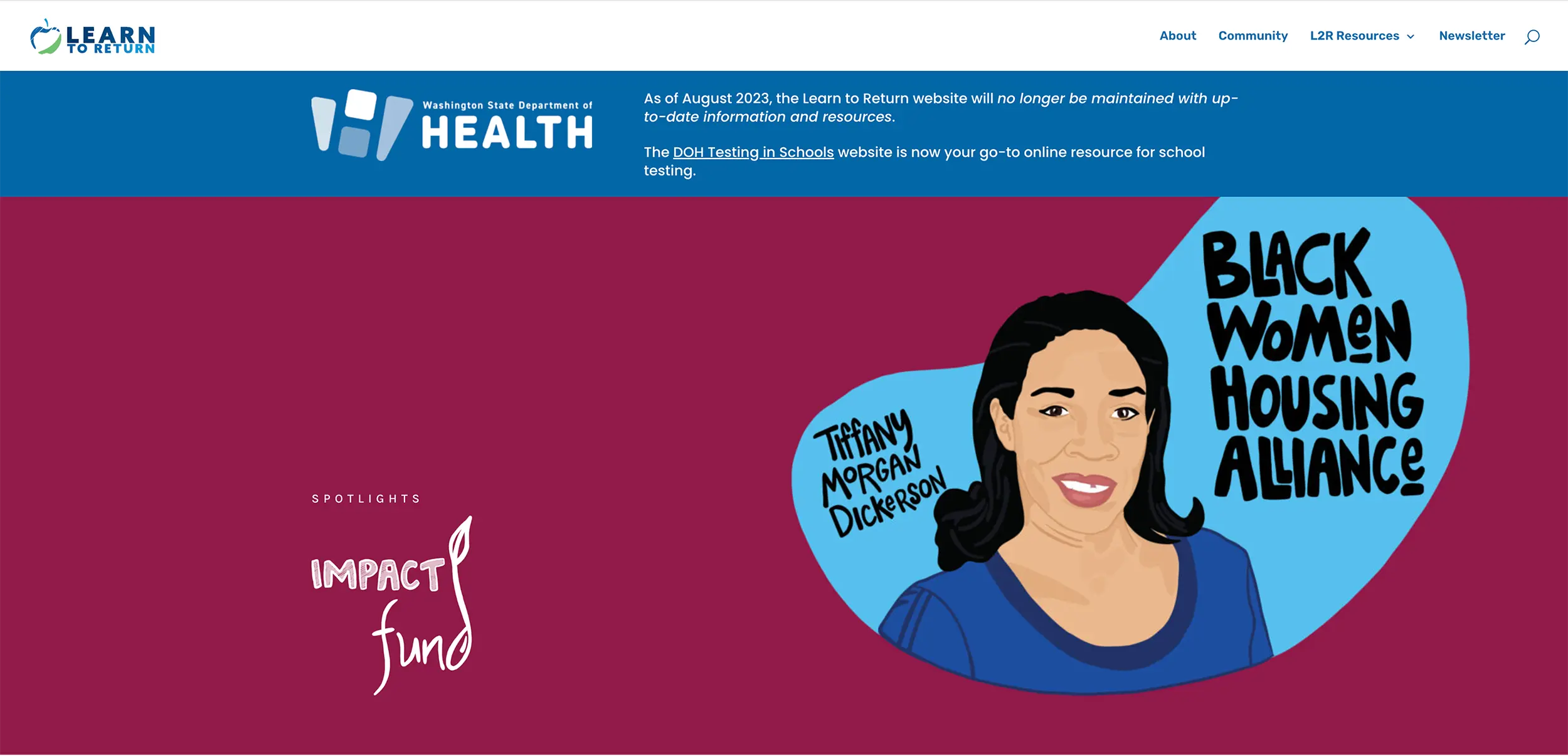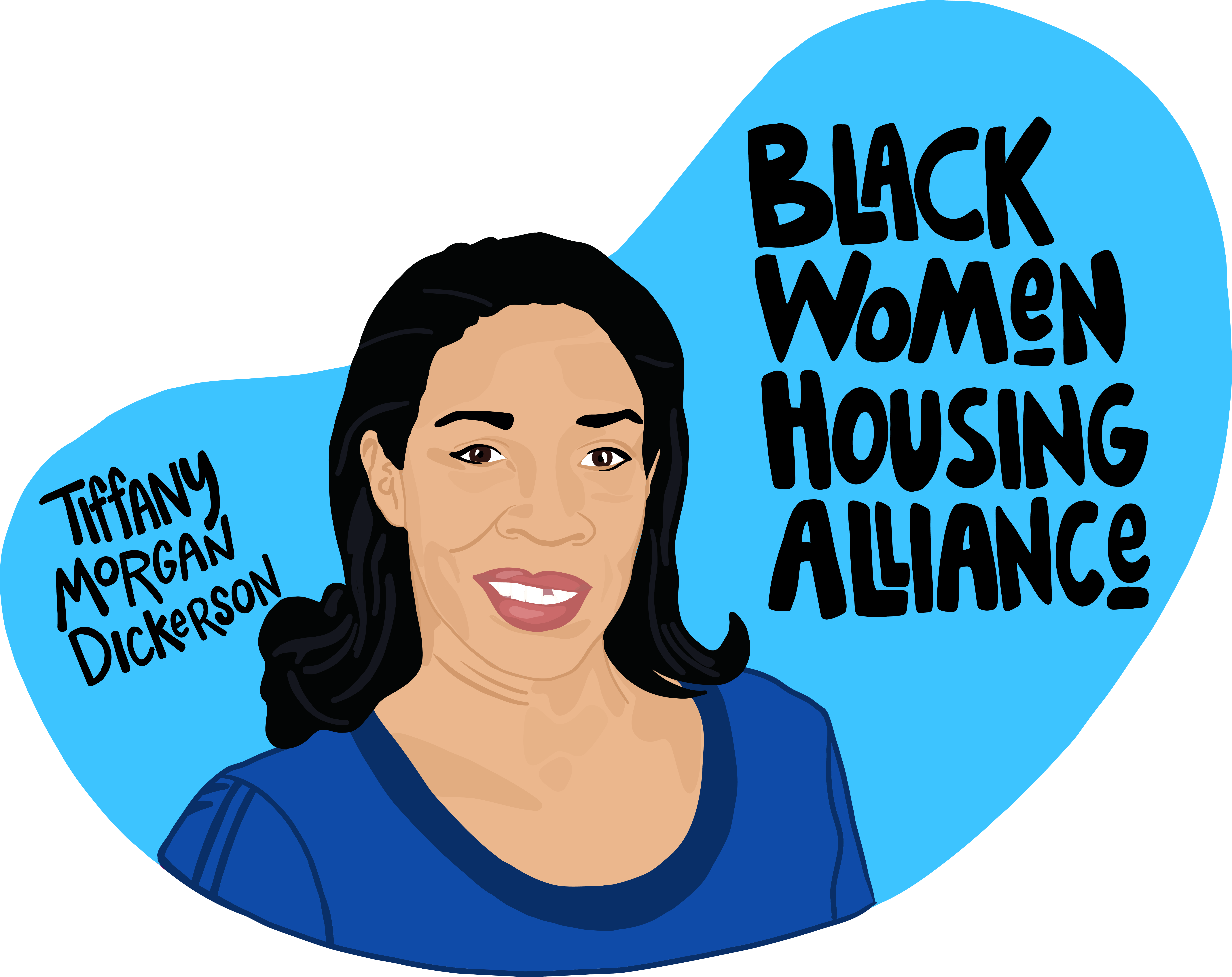L2R Spotlight
Black Women Housing Alliance


Black Women Housing Alliance
Be Well Campaign
Welcome to our Impact Fund Spotlight series, where we celebrate our partners who are addressing challenges posed by the COVID-19 pandemic. Today, we shine the spotlight on Tiffany Morgan Dickerson and the Black Women Housing Alliance (BWHA), an organization dedicated to promoting health and wellness while dismantling systemic racism.
In response to the ongoing pandemic, the BWHA launched the Be Well Campaign, focusing on K-12 populations in West Seattle and South Seattle. This campaign aimed to educate and empower youth and their families about preventing the spread of COVID-19 through testing, vaccinations, and other essential hygiene practices. By utilizing both online platforms and in-person ‘Be Well Festivals,’ the BWHA engaged with the community and made a lasting impact on the lives of those they served.
Join us as we interview Tiffany Morgan Dickerson, Executive Director and Founder of BWHA. Tiffany’s passion for serving children and the community, coupled with her extensive non-profit and community service experience, has been instrumental in driving the success of the Be Well Campaign and overall health awareness in our communities.
Tiffany (second from left) with colleagues and Health Commons Project staff at the BWHA Family Field Day at Martin Sortun Elementary School. BWHA handed out snacks, COVID-19 take-home tests, and masks.
In light of the COVID-19 pandemic, how did the challenges regarding systemic racism lead you to create the Be Well Campaign? How did you adapt your mission to that campaign?
Tiffany: That’s a good question. Basically, the Black Women Housing Alliance is dedicated to serving and supporting the African diaspora and BIPOC community. Our mission is to dismantle systemic racism and housing discrimination while promoting overall health and wellness. We achieve this through educational social events, workshops, and partnerships with various community organizations. Our vision is to create a safe and inclusive environment where everyone feels supported and empowered to have difficult conversations and take control of their overall health and wellness.
In light of the COVID-19 pandemic, how did the challenges regarding systemic racism lead you to create the Be Well Campaign? How did you adapt your mission to that campaign?
Tiffany: The COVID-19 pandemic highlighted the lack of awareness and information within our own community. We needed to address the hesitations and dismissals surrounding COVID-19. The Be Well Campaign focused on pushing awareness, providing a safe and healthy environment for conversations, and offering resources and information. Additionally, we recognized the impact of the pandemic on mental health and aimed to help families reconnect and communicate. The campaign allowed us to educate, support, and bring people together.
Could you share any experiences or specific examples that underscored the importance of that particular project on K-12 populations in South King County, West Seattle and South Seattle?
Tiffany: Absolutely. I chose to work with K-12 populations because they are the pulse of our future. By providing them with information and resources, we can shape a better outcome for them and our society as a whole. It’s crucial to empower children and teach them how to have healthy conversations about their well-being. Many kids, and even adults, had misconceptions about COVID-19, thinking it was over or didn’t exist anymore. By working and serving our children, we can change that narrative and promote resilience and open dialogue.
Let’s talk about the initial resistance and challenges that you faced while implementing the Be Well campaign. Could you share any difficulties that you faced while advocating for this and how you and your team maintained their motivation during the pandemic?
Tiffany: The biggest challenge has been engagement, breaking down the walls and building up the confidence of people to come back out and engage in a social aspect. That was challenging. I deal with communities of color, so there are economic barriers, time barriers, and life restraints. Our families and our community just don’t have the time to be available and accessible to even enjoy activities and opportunities that are free to their community. Even though we’re giving out free tests, food, and grab-and-go items to draw them in, in reality, because of their situations in life, they just don’t have the time capacity. That was one of the challenges with my junior interns as well. It was a challenge to keep and maintain the junior interns despite their interest. Parents wanted their kids to participate in the Be Well activities, the kids wanted to be involved, but they just didn’t have the time with other school activities, homework, maybe limited transportation, and extra siblings in the household. Those types of things made it difficult for the engagement process.
Was there any creative solution that you found that kind of resolved this issue, or was it something you just had to work through?
Tiffany: I partnered with the Martin Sortun Elementary School — the school that I was at was also with one of our junior interns — so that I could be on site to help support participation barriers by being there to make those transitions easier for them. Helping by building ways that they can have leadership roles within their school community, versus having to pull them away, I came to be included and part of their school life community.
I wouldn’t be the person you know and I am today without having my mentors, my parents, and my mom putting me into certain programs and certain activities that focus on leadership and management or even etiquette and communication. I took all kinds of classes and workshops that helped me to develop into my full self. Our kids don’t do or have things like when I was growing up around them today, and this is why I do what I do to help bring some of the basic and much needed tools and skills back.
Can you tell us about any significant collaborations that were pivotal in ensuring the success of the project? How did you build trust and support within these partnerships?
Tiffany: When it comes to collaborations, it was primarily through personal connections and face-to-face interactions. While I did use emails and phone calls, the real breakthrough happened when I showed up in person with a smile and a genuine desire to engage with our community. Building trust and support is about making those personal connections, establishing a rapport, and being there physically to address their concerns and needs. That personal touch and face-to-face interactions can make a significant difference in building relationships.
One of the most significant achievements for me is the long-term relationships that have been formed through this campaign. By providing free tests and masks, we were able to establish our presence within the school community. This has opened opportunities for ongoing dialogue groups and sessions focusing on overall health, mental wellness, and stress management. I have now connected with the PTA board, which opens doors to collaborate with other schools and communities. Additionally, I’ve been approached by a local community center to collaborate on building a comprehensive health program that extends beyond COVID-19. The impact of the campaign goes beyond addressing the immediate challenges of COVID-19. It has allowed us to create a safe space for children to express their feelings, build resilience, and learn to navigate through difficult situations. It’s incredibly rewarding to see the growth and empowerment of these young individuals.
I’m curious if you received any feedback from students and families who were involved in the social media campaigns. What was the impact on them?
Tiffany: The feedback from students and families who engaged with our social media campaigns has been inspiring. They shared how the campaign inspired them to be more accountable and engaged in their day-to-day lives, both at home and in the classroom. It encouraged them to be more hands-on and present, rather than just going through the motions. While our social media campaign didn’t go exactly as planned, due to unforeseen circumstances, we improvised and utilized our existing team to continue spreading our message.
The youth interns played roles similar to our coordinators, but in a youthful capacity. They acquired valuable administrative and organizational skills, and we focused on honing their communication abilities to effectively share information about COVID-19, available resources, and testing. They were integral to the entire process.
One of the interns also took on the role of a junior leader, acting as a facilitator between their peers and the school staff. This experience greatly boosted their self-confidence, and their peers looked up to them in a different way. It was a source of pride for him, and it inspired his peers to become more involved. They wanted to assist in distributing snacks, helping with tasks, and supporting the overall effort. He had his own team of enthusiastic individuals working alongside him.
As we conclude, I’m curious about the lasting impact of your project on the community. What do you believe has been the enduring effect?
Tiffany: The lasting impact of our project is the recognition of the importance of conversation and overall community healing. We emphasize the value of fellowship, shared information, and engaging in unfamiliar and difficult discussions. These principles will continue to resonate within our community. Despite the challenges we faced, people walked away from this experience with a sense of excitement and positivity rather than feeling discouraged. Personally, I have learned not to hold rigid expectations and to embrace adaptability. Sometimes, the final outcome can surpass our initial visions, even if it takes a different form. The relationships I have built, and the connections made during this project were incredibly meaningful, even without the extra data we had hoped for. This experience has highlighted the significance of the human aspect in our work, reminding me of its true importance.
To learn more about the impactful initiatives of the Black Women Housing Alliance and how you can get involved, please visit their website: Black Women Housing Alliance and their Facebook page: BWHA Facebook.
Visit BWHA Project page

Tacoma, Washington
West Chester, Pennsylvania
Home
About
Services
Projects
Contact

